|
|
|
Sort Order |
|
|
|
Items / Page
|
|
|
|
|
|
|
| Srl | Item |
| 1 |
ID:
141385
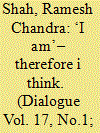

|
|
|
|
|
| Summary/Abstract |
The unprecedented explosion of knowledge in all fields on the one hand, and the virtual magic of I.T. revolution on the other would appear to have changed everything in our life-world. Most of us remnants of the older generation feel somewhat dazed and challenged by the new dispensation, replacing knowledge by knowledge-industry; books by ebooks; & education by the new-fangled phrase human resources. Management is the key word now: management gurus preside over all developments of culture today – rendering not only pure intellectuals, but even what was once called sage-mind irrelevant and superfluous. How with this rage shall Beauty or even what a great twentieth century poet called ‘The commonsense of the soul,’ hold a plea?
|
|
|
|
|
|
|
|
|
|
|
|
|
|
|
|
| 2 |
ID:
110142
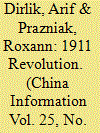

|
|
|
|
|
| Publication |
2011.
|
| Summary/Abstract |
The 1911 Revolution was a momentous event in bringing down the monarchical institution with a history of 2,000 years. Yet its consequences were ambiguous, it was overshadowed by the more radical revolution that followed in 1949, and it was stigmatized by the defeat of the Kuomintang, which claimed it as its own. Its 'revolutionariness' has been in question even as it has been celebrated as a turning point in modern Chinese history. This discussion reaffirms the revolutionary significance of the event, but also suggests that it is best viewed as a 'high peak' in a revolution of long duration that is yet to be completed. The current regime in China has revived aspects of monarchical culture and practices that revolutionaries sought to abolish in 1911. Most importantly, the promise of full citizenship for all that animated the 1911 Revolution remains unfulfilled, which may explain the contemporary regime's nervousness over the celebration of its 100th anniversary.
|
|
|
|
|
|
|
|
|
|
|
|
|
|
|
|
| 3 |
ID:
117610
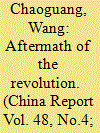

|
|
|
|
|
| Publication |
2012.
|
| Summary/Abstract |
The Revolution of 1911 in China not only put an end to the feudal monarchy that had lasted several centuries but also opened a new chapter, the era of republicanism in China. The founding of the Republic of China led to the proliferation of political parties, the thriving of legislative organs and the emergence of a cabinet system. However, historical evolution does not always conform to people's expectations. Revolutionary ideals could not be fully realised in a country which had been dominated by authoritarianism for thousands of years. As a result, Western-style democracy failed to take root in Republican China. Instead of embarking on a journey towards democracy, prosperity and independence, China gradually descended into a state where warlords took control and plunged the whole country into conflict.
|
|
|
|
|
|
|
|
|
|
|
|
|
|
|
|
| 4 |
ID:
147202
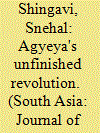

|
|
|
|
|
| Summary/Abstract |
Sachchidananda Hiranand Vatsyayan, also known as ‘Agyeya’, famously penned his three-volume modernist Hindi novel, Shekhar: Ek Jivani (Shekhar: A Life) while he was imprisoned by the British during 1930–33 for his participation in revolutionary terrorist activities. The novel, however, was incompletely published: only the first two volumes were released (in 1941 and 1944, respectively). The incompleteness of Agyeya's Shekhar manifests both writerly dissatisfaction and the transformation of the political landscape in newly independent India. Shekhar, a story of the life of a revolutionary, becomes impossible once revolution is undesired and impossible. The form of the novel, its revolutionary ambition and the construction of a writerly sensibility are all exhausted in the same moment. While revolutionary ambition is normally associated in Hindi with the realism of the All India Progressive Writers Movement (AIPWA), Agyeya's modernism was born out of aesthetic debates that he had with the poets affiliated to the AIPWA and from his Trotskyist politics.
|
|
|
|
|
|
|
|
|
|
|
|
|
|
|
|
| 5 |
ID:
137408


|
|
|
| 6 |
ID:
099083
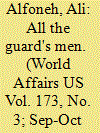

|
|
|
| 7 |
ID:
190026
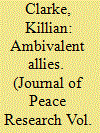

|
|
|
|
|
| Summary/Abstract |
Since the Cold War ended, foreign support has been identified as an important factor in facilitating democratization. However, in certain parts of the world Western enthusiasm for democratization has been highly uneven, particularly when regime change has been achieved through nonviolent revolutionary mobilization. This article introduces the concept of ‘ambivalent allies’ and argues that ambivalence may be highly detrimental to new democracies emerging from nonviolent resistance. Ambivalent allies signal public support for a democratic transition while remaining quietly skeptical about the desirability or viability of the new regime. These misleading signals cause democratic leaders to deprioritize the maintenance of their diverse coalitions, choosing instead an exclusivist approach that alienates their domestic partners. They therefore end up doubly exposed to counterrevolutionary threats, lacking both a broad domestic support base and strong foreign backers. The article illustrates this argument through an examination of Egypt’s 2011 revolution and 2013 coup, drawing on approximately 100 interviews with Egyptian political leaders and foreign diplomats. It shows that the USA’s ambivalence toward the transition contributed to the coup by giving the elected government headed by Mohamed Morsi a false impression that it had strong foreign backing, and that it could afford to marginalize the secularist wing of the original revolutionary coalition. Egypt’s experience is then compared to two cases in which new governments survived counterrevolutionary threats: Burkina Faso in 2014 and Madagascar in 2009. The study contributes to our understanding of how international support may facilitate or undermine democratic consolidation following nonviolent revolutions.
|
|
|
|
|
|
|
|
|
|
|
|
|
|
|
|
| 8 |
ID:
188818
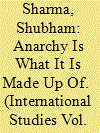

|
|
|
|
|
| Summary/Abstract |
In this article, I attempt to critically assess Kenneth Waltz’s deployment of the idea of anarchy to erect a ‘scientific theory of international politics’. First, I argue that the formation of a concept requires comprehension of the object from the standpoint of historical development, not a narrow reading of it. Second, I subject the thinner abstractions of self-help, balance of power and bandwagoning to the test of history. Third, I argue about mainstream international relations’ disdain for revolutions. I would posit that revolutions are fine templates which store rich agential history of structural transformation, a theme subject to much chagrin by realists of all hues, particularly neorealists. In doing so, I take the Bolshevik Revolution of 1917 as my benchmark. I elucidate that through the occlusion of first and second images, man and state, in the favour of third image, that is, structural anarchy, Waltz tends to ignore the role of agency as a conscious collective which could be best captured by the Bolshevik Revolution. In doing so, I rely on Perry Anderson’s three modes of agency in history. As a corrective to Waltz’s theorization, I make a strong case for class transcending both man and state as an organic category with immense potential of becoming a level of analysis which both acts upon the structure and refracts through it. I finally conclude by saying that anarchy was a condition and not a ‘social relation’ of any sort which could claim to constitute the ‘international’.
|
|
|
|
|
|
|
|
|
|
|
|
|
|
|
|
| 9 |
ID:
181928


|
|
|
|
|
| Summary/Abstract |
The Chinese Communist Party's (CCP) ideology, rooted in its foundational struggles, explicitly denounces “bureaucratism” (guanliaozhuyi) as an intrinsic ailment of bureaucracy. Yet while the revolutionary Party has blasted bureaucratism, its revolutionary regime has had to find a way to coexist with bureaucracy, which is a requisite for effective governance. An anti-bureaucratic ghost thus dwells in the machinery of China's bureaucratic state. We analyse the CCP's anti-bureaucratism through two steps. First, we perform a historical analysis of the Party's anti-bureaucratic ideology, teasing out its substance and emphasizing its roots in and departures from European Marxism and Leninism. Second, we trace both the continuity and evolution in the Party's anti-bureaucratic rhetoric, taking an interactive approach that combines close reading with computational analysis of the entire corpus of the People's Daily (1947–2020). We find striking endurance as well as subtle shifts in the substance of the CCP's anti-bureaucratic ideology. We show that bureaucratism is an umbrella term that expresses the revolutionary Party's anxiety about losing its popular legitimacy. Yet the substance of the Party's concern evolved from commandism and revisionism under Mao, to corruption and formalism during reform. The Party's ongoing critiques of bureaucratism and formalism unfold in parallel fashion with its efforts to standardize, regularize and institutionalize the state.
|
|
|
|
|
|
|
|
|
|
|
|
|
|
|
|
| 10 |
ID:
075864
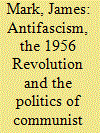

|
|
|
|
|
| Publication |
2006.
|
| Summary/Abstract |
Using oral history, this contribution explores the reshaping of individuals' public and private autobiographies in response to different political environments. In particular, it analyses the testimony of those who were communists in Hungary between 1945 and 1956, examining how their experiences of fascism, party membership, the 1956 Revolution and the collapse of communism led them in each case to refashion their life stories. Moreover, it considers how their biographies played varying functions at different points in their lives: to express identification with communism, to articulate resistance and to communicate ambition before 1956; to protect themselves from the state after 1956; and to rehabilitate themselves morally in a society which stigmatised them after 1989.
|
|
|
|
|
|
|
|
|
|
|
|
|
|
|
|
| 11 |
ID:
032692


|
|
|
|
|
| Publication |
New York, Hudson Institute, Inc, 1973.
|
| Description |
iii, 307p.
|
| Contents |
V 3 Future of the Future of the Nixon Doctrine in Pacific Asia
|
|
|
|
|
|
|
|
|
|
|
|
Copies: C:1/I:0,R:0,Q:0
Circulation
| Accession# | Call# | Current Location | Status | Policy | Location |
| 017236 | 327.7305/YOK 017236 | Main | On Shelf | General | |
|
|
|
|
| 12 |
ID:
040028
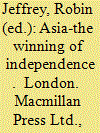

|
|
|
|
|
| Publication |
London, Macmillan Press Ltd., 1981.
|
| Description |
xv, 337p.pbk
|
| Standard Number |
0333278577
|
|
|
|
|
|
|
|
|
|
|
|
Copies: C:1/I:0,R:0,Q:0
Circulation
| Accession# | Call# | Current Location | Status | Policy | Location |
| 027517 | 950.4/JEF 027517 | Main | On Shelf | General | |
|
|
|
|
| 13 |
ID:
107229
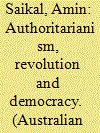

|
|
|
|
|
| Publication |
2011.
|
| Summary/Abstract |
The pro-democracy Arab popular uprisings have been spontaneous, but perhaps not all that unpredictable. They have come against the backdrop of a growing gulf between the rulers and the ruled, political repression, social and economic inequalities, demographic changes, unemployment and foreign policy debacles. Although the uprisings began in Tunisia, it is the case of Egypt that illustrates the situation more compellingly and the impact that it has had on the rest of the Arab world. It is not clear at this stage what will be the ultimate outcome. But what can be said with certainty is that the Arab peoples have set out on a long journey in pursuit of genuine self-determination. The journey will be arduous and unsettling for the Arabs and outsiders, but this has to be treated as part of a transition from a dictatorial past to a politically pluralist future.
|
|
|
|
|
|
|
|
|
|
|
|
|
|
|
|
| 14 |
ID:
100496
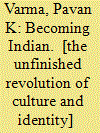

|
|
|
|
|
| Publication |
New Delhi, Allen Lane, 2010.
|
| Description |
xi, 275p.
|
| Standard Number |
9780670083466,hbk
|
|
|
|
|
|
|
|
|
|
|
|
Copies: C:1/I:0,R:0,Q:0
Circulation
| Accession# | Call# | Current Location | Status | Policy | Location |
| 055501 | 954.052/VAR 055501 | Main | On Shelf | General | |
|
|
|
|
| 15 |
ID:
131343
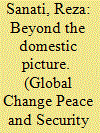

|
|
|
|
|
| Publication |
2014.
|
| Summary/Abstract |
This article examines the geopolitical determinants that have underpinned contemporary Iran-US relations, challenging the established thinking on why this relationship has been characterized by hostility. It is argued that the primacy that has been given to the role of domestic politics in either the US or Iran, as being the main arbiter of this relationship, is incomplete. This relationship is just as much a product of the structural conditions within the Middle East and the wider international system, which created the conditions for the clashing of the core national interests of both these states. However, due to the massive political and social alterations within the Middle East in the past decade, the notion of 'strategic irreconcilability' between both actors is now fundamentally changing. This has given room for a possible recalibration of the Iran-US relationship. Ultimately, it is argued that the synthesis of the domestic, the regional, and geopolitical levels of analysis are needed for a more holistic picture of the past, present, and future of Iran-US ties.
|
|
|
|
|
|
|
|
|
|
|
|
|
|
|
|
| 16 |
ID:
154909
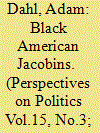

|
|
|
|
|
| Summary/Abstract |
While scholars of African American political thought have done a remarkable job centering focus on black thinkers, they still largely frame their endeavor in reference to the geo-political boundaries of the U.S. nation-state, thereby ignoring the transnational and diasporic dynamics of black politics. The consequence is that alternative traditions of thought in the Americas—e.g., Caribbean traditions—are cast as irrelevant to questions of racial exclusion in U.S. political thinking. I seek to correct nation-centric perspectives on U.S. political thought and development by demonstrating the utility of the “transnational turn.” Drawing on the framework developed in C.L.R. James’s The Black Jacobins, I trace how an influential cohort of abolitionists in the antebellum United States looked to the Haitian Revolution as a model for the overthrow of slavery. Engaging the writings and speeches of David Walker, James Theodore Holly, and Frederick Douglass, I then argue that radical abolitionists operated in the same ideological problem-space as Haitian revolutionaries and adopted a specific model of revolution as much indebted to Haitian political thought as Anglo-American models of anti-colonial revolt. By implication, racially egalitarian movements and moments in U.S. political development cannot be adequately understood with exclusive reference to national traditions of thought.
|
|
|
|
|
|
|
|
|
|
|
|
|
|
|
|
| 17 |
ID:
173443
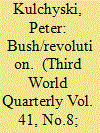

|
|
|
|
|
| Summary/Abstract |
This article argues that bush people deserve greater attention in revolutionary thought and action, both for the strategic value of their struggles against extraction at capital’s periphery and the emancipatory social values they continue to embody. But bush struggles cannot be borrowed for other purposes: the agenda of bush people for respect and cultural survival must respected in its own right.
|
|
|
|
|
|
|
|
|
|
|
|
|
|
|
|
| 18 |
ID:
139602
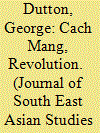

|
|
|
|
|
| Summary/Abstract |
This article traces the etymology of the term ‘revolution’ as it developed in Việt Nam between the second half of the nineteenth and the early twentieth centuries. It argues that the term was slow to catch on, and that activists who used it did so in often contradictory ways. The term's historical development complicated efforts to fix its meaning, and it was not until the later part of the 1920s that it came to be consolidated, in part through Hồ Chí Minh's publication of a short book entitled Đường Kách Mệnh (The road to revolution).
|
|
|
|
|
|
|
|
|
|
|
|
|
|
|
|
| 19 |
ID:
043592
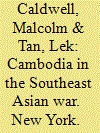

|
|
|
|
|
| Publication |
New York, Monthly Review Press, 1973.
|
| Description |
xiii, 446p.hbk
|
| Standard Number |
0853451710
|
|
|
|
|
|
|
|
|
|
|
|
Copies: C:1/I:0,R:0,Q:0
Circulation
| Accession# | Call# | Current Location | Status | Policy | Location |
| 012168 | 959.70433596/CAL 012168 | Main | On Shelf | General | |
|
|
|
|
| 20 |
ID:
141319


|
|
|
|
|
| Summary/Abstract |
A new nation is arguably in the making. However, the economy has collapsed, and not enough has changed in the political system. [I]t is too early to celebrate even the positive trends as permanent.
|
|
|
|
|
|
|
|
|
|
|
|
|
|
|
|
|
|
|
|
|